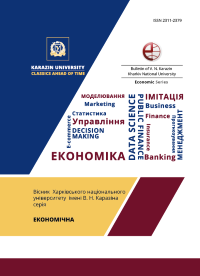Responsible investment benchmarks and information asymmetry in the ESG segment
Abstract
A significant problem in achieving the Sustainable Development Goals (hereinafter referred to as the SDGs) is insufficient financial support. The size of the investment gap before the pandemic, according to UN estimates, was $3.3-$4.5 trillion per year. The pandemic has significantly exacerbated the already difficult situation with financing, and has also set back humanity in achieving a number of the SDGs. The list of potential sources of offsetting the financial gap includes new taxes on the wealthy and pollution, debt relief for low- and middle-income countries, elimination of tax loopholes, redirection of subsidies from environmentally destructive activities, etc. However, a more market-oriented and gentle solution to the problem, both globally and at the level of individual countries, is the use of responsible investment tools. After all, ESG indicators are taken into account by investors and financial institutions when making investment and lending decisions, as well as by counterparties and suppliers in the course of commercial activities. ESG indicators are information about the environmental, social and governance factors of a company that are key to measuring the sustainability and ethical impact of investments in a company and business. The successful implementation of responsible investment is hampered by the existence of information asymmetry, for example, in the form of ESG mimicry. It means the use of various techniques that indicate the company's involvement in ESG, which is not really true. The goal of this article is to analyze effective methods for reducing information asymmetry in the ESG segment. It is proved that the use of responsible investment benchmarks in the form of ESG ratings can reduce the level of information asymmetry and increase the efficiency of responsible investment. In addition, the paper proposes a five-phase process for creating an ESG rating, which summarizes the experience of the best international practices and allows for more relevant assessments of companies' ESG efforts.
Downloads
References
International Development Finance Club. (2020). International Development Finance Club. Retrieved from https://www.idfc.org/publications/
Pedersen, L. H., Fitzgibbons, S., and Pomorski L. (2019). Responsible Investing: The ESG-Efficient Frontier. Working paper, AQR Capital Management, LLC (18 October). Retrieved from https://papers.ssrn.com/sol3/papers.cfm?abstract_id=3466417
Murfin, J., Spiegel, M. (2020). Is the Risk of Sea Level Rise Capitalized in Residential Real Estate? The Review of Financial Studies, 33(3), 1217–1255. doi: https://doi.org/10.1093/rfs/hhz134
Oehmke, M., Opp, M. M. (2019). A Theory of Socially Responsible Investment. Swedish House of Finance Research, 20-22. Retrieved from https://papers.ssrn.com/sol3/papers.cfm?abstract_id=3467644
Dai, Rui, Hao Liang, and Lilian, K Ng. (2019). Socially responsible corporate customers. Journal of Financial Economics (JFE), Forthcoming.
Environmental, Social and Governance Ratings and Data Products Providers. (2021). Retrieved from https://www.iosco.org/library/pubdocs/pdf/IOSCOPD681.pdf
ESG-focused institutional investment seen soaring 84% to US$33.9 trillion in 2026, making up 21.5% of assets under management: PwC report (2022). Retrieved from https://www.pwc.com/gx/en/news-room/press-releases/2022/awm-revolution-2022-report.html
Freyman, M. (2020). COVID-19 elevates the value of responsible investing. Responsible investor. Retrieved from https://www.responsible-investor.com/covid-19-elevates-the-value-of-responsible-investing/
OECD: Global Outlook on Financing for Sustainable Development 2021: A New Way to Invest for People and Planet [Online]. Retrieved from https://www.oecd-ilibrary.org/sites/6ea613f4-en/index.html?itemId=/content/component/6ea613f4-en
Plastun, A., Makarenko I., Kravchenko O., Ovcharova N. and Oleksich Z. (2019). ESG disclosure regulation: in search of a relationship with the countries' competitiveness. Problems and Perspectives in Management, 17(3), 76-88. doi: https://doi.org/10.21511/ppm.17(3).2019.06
CR02/2021. (2021). Environmental, Social and Governance (ESG) Ratings and Data Products Providers. Retrieved from https://www.iosco.org/library/pubdocs/pdf/IOSCOPD681.pdf
International Organization of Securities Commissions (IOSCO). Environmental, Social and Governance (ESG) Ratings and Data Providers. (2021). Retrieved from https://www.iosco.org/library/pubdocs/pdf/IOSCOPD690.pdf
ESG index of transparency of Ukrainian companies' websites. (2020). Retrieved from https://csr-ukraine.org/research/indeks-esg-prozorosti-saytiv-ukrainski/ (in Ukrainian)
Michael, T. (2022). The Rise of ESG Investing, Retrieved from https://www.insiderintelligence.com/content/rise-of-esg-investing

